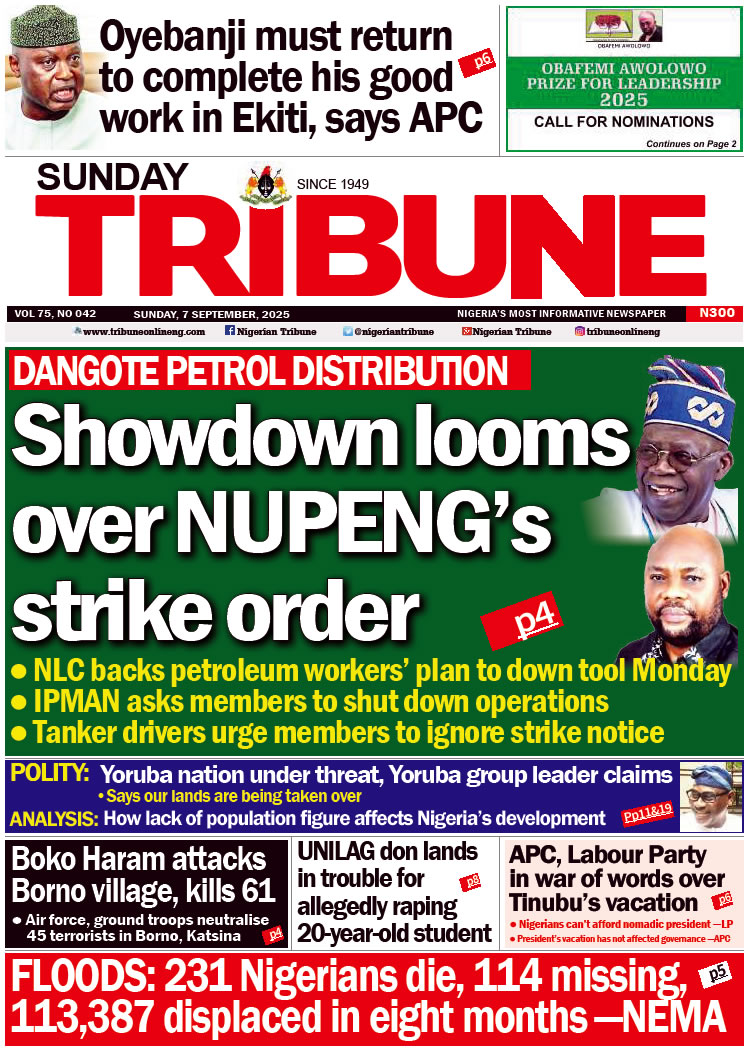Toyin Ayinde, President of the Nigerian Institute of Town Planners (NITP), believes it is the responsibility of the government to plan human settlements. In this interview with DAYO AYEYEMI, the renowned urban planner spoke extensively about the imperative of plans and change of mindset if Nigeria’s cities are to be developed sustainably. He also spoke on other issues.
Let’s look at the entire country; can you say that Nigeria has sustainable cities?
We can’t develop sustainably because we have to plan to develop sustainably. There is an imperative need for us to plan. It is imperative. We either plan or perish. I relate it in an analogy and flip it back to what people can understand. The analogy is that if you throw a piece of bone before a dog that dog wags its tail, dances around you and is happy. If you throw the same piece of bone between two dogs, they will smile at each other, they bark at each other. If you take that same piece of bone, throw it in the middle of 50 dogs and try to imagine what would happen. They will actually leave the bone and fight themselves to finish. And when one thinks it has the uppermost hand and wants to rush the bone, another one that has gained strength will rush it. Why is that? It is because the bone is the only resource they can see. It cannot be increased nor multiplied. Therefore, that is the only bone that all of them must consume. And because the bone is insufficient and they don’t have the brain to manage it, they will fight to finish. I call this bone the land territory of Nigeria. I was taught when I was in Form One – that was 1971 – to draw the map of Nigeria – with Mali, Chad and Egypt at the North, Lake Chad at the east, Cameroun on the east, Togo- Benin on the West, and Atlantic Ocean at the south. My teacher told me Nigeria was 56 million in that territory. We are in 2021, 50 years from 1971, we have not been able to inch into Niger, Mali or Chad. We have not been able to take any part of their land nor move into Cameroun, but the other way round. Cameroun succeeded in taking Bakassi from us, meaning that the land called the territory of Nigeria now, is even less than what my tutor told me to draw in 1971. The population’s projections say we are over 211 million people this year, in the same territory. In a few years’ time, our population will increase to 300 million, 400 million but our land resource will not. In fact, it will continue to decrease because climate change will take more from us. If you can now relate that to the analogy of the dogs with the bone, I am sure you will be able to relate it with the inter-communal clashes. You know communities that have been related over centuries without fighting are now fighting. What are they fighting for? It is land. Farmers- herders’ clash – when we did not have that population, did they fight? No. Our population is increasing, there is going to be more fights. So what do other nations do when they know that their land resources are fixed? The only way to manage what is fixed that you cannot increase is that you plan it. A nation like Singapore offers us an example. Singapore is 728 square kilometres , that is the size. It is smaller than Lekki Phase 1 that is 755 square kilometres, yet Singapore has 8,600 high rise structures. The whole of Lagos state has less than 200 high rise structures. When we say Singapore’s highrise, we are not talking of 15 floors, we are talking of 40, 45 floors. So, they managed their resources, and managed it in such a way that they still have more open recreational parks than they have in Lagos state.
Singapore has more commercial hubs than we have in Lagos state; it has conservation land, I mean land they will never develop because it is for conservation. We need to take charge of our territory and plan it accordingly. We must plan from the global level before we come to the specific – from the general before we come to the specific, because it is from the general level that we can relate everything. We can begin to identify the areas we will never develop, areas that will be for agriculture and areas that will be for open parks. It is at a general level before we begin to move down to specific. If we do that, we will begin to understand that we cannot sustain the bungalows and two-floor buildings we are developing. That is where sustainability comes in. So we have to go up.
What does going up help us to achieve?
It mops up the structures that spread on ground and help us to have more room for public transportation, public open parks, gardens, open spaces and conservation. That makes sustainability possible. Thereafter, there are things we need to change in our mind set, for example, owning houses for accommodation. We need to move from the individual’s allocation of plot. In other countries, they don’t do individual’s allocation of plots. They do bulk allocation and corporations come in to build. Individuals do not go to the market to buy cement and blocks because they want to build. It is done corporately. What you need to do is to identify the apartment you want to subscribe to and pay for it. So those are the kinds of mindset’s change that we need in Nigeria. It is going to take us for a while, but we need to begin now.
But we don’t have the infrastructure for vertical building. How do we go about it?
Necessity is always being the mother of invention. If we say we don’t have anything we will never develop. If we make up our minds, I’m telling you that decision determines destiny. So we must commit first to that decision. Who ever knew that we could have landscape in Lagos until Fashola came in as a governor? It is about commitment, it is about our decision to change our own life.
What do urban planners need the government to do?
We need the government to own up to the responsibility to plan. I tell people who want to attack town planners that they are not planning, that it is actually not the responsibility of planners to plan. It is the responsibility of the government to plan, just like it is the responsibility of the government to uphold law and order. You know that the governor is not a lawyer, even if a lawyer, he is not a judge and he is not the one that will run the system. But it is the responsibility of the governor to uphold the rule of law. So it is the responsibility of the government to plan human settlements.
What do you mean?
This is because the government is the one that possesses the Power of Eminent Domain to take over large areas for overriding public interest. Once the government does that, the responsibility to plan those settlements also lie in them.
What is the role of town planners?
Town planners are like the lawyers and judges who work in the judiciary system to make rule of law possible. So it is their own knowledge, duty and applied wisdom to turn the government’s plan into equipment. Those are the plans that you see on papers, and then become the responsibility of the government again to implement those plans. No matter how good a town planner is, he can’t take his money and decides to plan Lagos. If Lagos is planned, he can’t take his money and begins to implement those plans. That is the responsibility of the state government. So what NITP wants the government to do is to live up to its responsibility, cast the vision on behalf of the people, and then follow up by funding the preparation of plans and implementing those plans to make Nigeria sustainable.
The Federal Government has just announced the return of toll gates on some of the federal roads. Are you seeing a departure from the past where money realized from the tolls went into private pockets?
I will want to concern myself to address the issue as a professional. I think whether there would be corruption around it is the business of the government. Government knows how to pluck the loopholes. Let us not forget that having tolls on roads is a global thing, but it is the methodology. I have been in Chicago and there are various types. I have been in one that you throw the coin in to a basin and if is not enough the toll will not be open. What we should be asking ourselves is about the likely benefits? You know infrastructure ought to be paid for but we have been given the impression through many of these things that they are free. The truth is that there are some commitments of funds to all these things. How did they get recouped? And the resistance of most people is that they are not seeing that benefits coming back. I think if the government gets this right, especially the payment, if it does not go into individual hands, one of the things it does overtime is that, government can recoup the cost of providing infrastructure. If this happens, the government can maintain and build more infrastructure.
Thirdly, it would afford the government the opportunity to continue to maintain the road. Once there is constant revenue coming from daily use of the roads, there would be funding for maintenance. The success depends on how the government wants to do it. Government must make a radical departure from what it used to be. It can take a queue from the Lekki Toll Plaza. Government needs to eliminate cash. Once it does that there would be accountability.
YOU SHOULD NOT MISS THESE HEADLINES FROM NIGERIAN TRIBUNE
We Have Not Had Water Supply In Months ― Abeokuta Residents
In spite of the huge investment in the water sector by the government and international organisations, water scarcity has grown to become a perennial nightmare for residents of Abeokuta, the Ogun State capital. This report x-rays the lives and experiences of residents in getting clean, potable and affordable water amidst the surge of COVID-19 cases in the state…
Selfies, video calls and Chinese documentaries: The things you’ll meet onboard Lagos-Ibadan train
The Lagos-Ibadan railway was inaugurated recently for a full paid operation by the Nigerian Railway Corporation after about a year of free test-run. Our reporter joined the train to and fro Lagos from Ibadan and tells his experience in this report…
WATCH TOP VIDEOS FROM NIGERIAN TRIBUNE TV
- Let’s Talk About SELF-AWARENESS
- Is Your Confidence Mistaken for Pride? Let’s talk about it
- Is Etiquette About Perfection…Or Just Not Being Rude?
- Top Psychologist Reveal 3 Signs You’re Struggling With Imposter Syndrome
- Do You Pick Up Work-Related Calls at Midnight or Never? Let’s Talk About Boundaries






